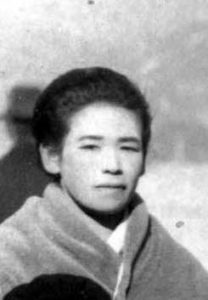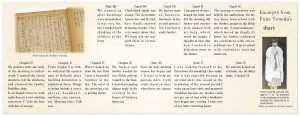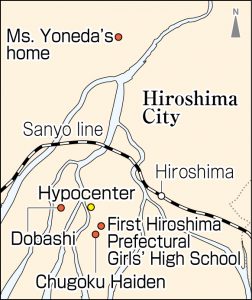Hiroshima document 1945: 13-year-old’s “tomorrow” stolen by war
Aug. 5, 2024
She was excited about school entrance ceremony, helped parents, saw rainbow from rice field, and went to work on August 6
by Kyosuke Mizukawa, Senior Staff Writer, and Ikumi Yorikane, Staff Writer
The flames of war are never-ending. Even fears about the use of nuclear weapons are rising. Hiroshima documents recording the atomic bombing of Hiroshima in detail should be shared with humanity around the world to ensure such a tragedy is never repeated. In the run-up to the 80th commemoration of the atomic bombing next year, we hope to communicate these Hiroshima documents along with memories and thoughts of A-bomb victims, beginning with a young girl’s diary that ended on August 5, 1945. The 13-year-old, excited about school life, had before long been mobilized for dangerous work associated with the war effort, resulting in her “tomorrow” being stolen by the merciless nuclear attack.
The diary of the 13-year-old Fujie Yoneda begins on April 6, 1945. Ms. Yoneda had left her home in the area of Gion-cho (now part of Hiroshima’s Asaminami Ward) to attend as a first-year student the entrance ceremony of the First Hiroshima Prefectural Girls’ High School (present-day Minami High School), which was located in Shimonaka-machi (now part of the city’s Naka Ward).
One passage in her diary reads, “My mother, who went to the school with me, clearly taught me the way. Starting tomorrow, I’ll go to school in high spirits.”
She was the pride of her mother, Chie, who died in 1983 at the age of 79. Kiyoshi, 70, Ms. Yoneda’s nephew who was born after the war, said his memory is imprinted with the sight of Chie praying for her daughter in front of a photograph placed on a dresser. “The photo was taken of my aunt dancing at a local shrine as a shrine maiden. I heard it was customary for the top girl student at Hara National School (now Hara Elementary School) to have the honor of dancing. My grandmother (Chie) was very happy about that.”
In her diary entry dated April 10, Ms. Yoneda wrote, “I’ll try my best to get good grades.” While eager to do well at school, she also worked hard to help her parents, who were farmers. In a diary section titled “Help,” she wrote, “tended to cucumbers” and “pulled up onions,” adding she was “happy” that her parents were pleased with her help.
On the other hand, with the war situation badly deteriorating, air raids were intensifying throughout Japan. On May 17, she was mobilized for the first time to engage in the work of building demolition to create fire lanes in preparation for air raids. In a diary entry dated May 26, she wrote, “I worked hard while thinking of the soldiers at the front.” She picked up and collected roof tiles and pieces of wood from the demolished buildings.
Beginning in June, students were mobilized to work outside the school for land cultivation. Classes were often interrupted by alerts and air raid warnings. When she fortunately was able to stay in classes until the fifth period on July 26, she wrote in her diary, “I hope for the same tomorrow.” She added, “My biology teacher was explaining something very interesting. Fortunately, enemy planes did not attack today. I also hope none will come tomorrow.”
Around that time, the sixth phase of large-scale, building-demolition work started in the central area of the city. First-year students at her school were ordered to work in the Dobashi area (now part of Hiroshima’s Naka Ward) starting on August 6. In her diary entry of August 4, Ms. Yoneda wrote, “Meeting time, 7:20 a.m.”
August 5 was a Sunday. Ms. Yoneda woke up at 4 a.m. to help with the work of shipping vegetables, and then she cleaned the family Buddhist altar and practiced calligraphy. She wrote, “I plan to work hard” starting August 6. That was the last page of her diary.
In her personal account 31 years later, Chie described the August 6 that her daughter was unable to write in her diary. Chie woke up at 4 a.m. and was making a lunch for her when her daughter woke up. “Her cheerful voice asking what time it was still rings in my ears, fixed in my mind.”
Chie and her daughter left home together that day because the market for shipping vegetables was located near her daughter’s gathering place for the mobilization work. As Chie was about to go after seeing her daughter off, Ms. Yoneda ran after her.
Chie wrote, “I let go of my daughter’s hand, which was holding mine, and told her to go so as not to be late. After walking about 30 meters, I turned around and waved to her goodbye. Who could have known that would be the last time I would see my daughter alive? It is beyond the comprehension of a mere mortal.”
In the predawn hours of August 6, a U.S. B-29 bomber carrying an atomic bomb had taken off from Tinian Island in the western Pacific, heading for Japan.
(Originally published on August 5, 2024)










